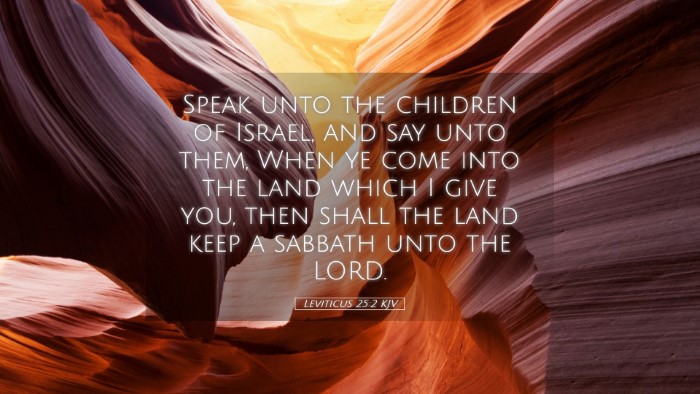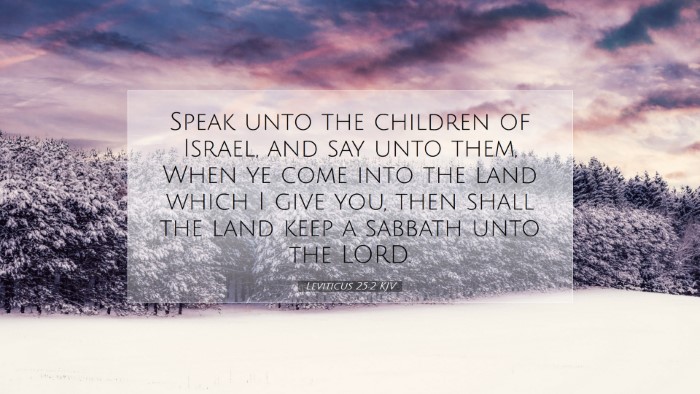Bible Commentary on Leviticus 25:2
Verse: "Speak unto the children of Israel, and say unto them, When ye come into the land which I give you, then shall the land keep a sabbath unto the Lord."
Introduction
Leviticus 25:2 introduces a vital concept in the covenant community of Israel—the idea of the land's sabbath. This command is significant not only to the Israelites but also carries theological implications that resonate throughout biblical history.
Theological Overview
This verse emphasizes God's authority over the land and His intention to instill a rhythm of rest and renewal in creation. According to Matthew Henry, this mirrors the creation Sabbath, where God rested on the seventh day, establishing a rhythm that humanity and all creation should observe.
God's Ownership and Sovereignty
Albert Barnes notes that the directive to keep a sabbath for the land acknowledges God as its ultimate owner. “The land, though occupied by the Israelites, belongs to God, and its true rest demonstrates His providential care.” Each sabbath year assures a restorative period for the earth, reflecting God's concern for both creation and His people.
Symbolism of Rest
Adam Clarke elaborates on the spiritual symbolism inherent in this passage. The sabbath year not only physically rejuvenates the soil but also serves as a reminder to Israel of their dependence on God’s provision. The cessation of agricultural work signifies trust in God that He will provide, reinforcing their faith and societal values.
Contextual Analysis
Understanding Leviticus 25:2 requires exploring the cultural and social framework of ancient Israel. This legislation comes as part of a broader legal and moral code aimed at establishing a just society.
Historical Significance
In ancient agrarian societies, the sabbath of the land is a radical departure from typical agricultural practices, which demand continuous labor for sustained output. As Matthew Henry notes, this reflects a divine architecture that promotes balance in community life and ecological stewardship.
Social Justice Implications
Albert Barnes points out the social justice angle of the sabbath year. The resting of the land assures periodic renewal, allowing those impoverished or in debt to return to their rightful place. This becomes an act of mercy, reflecting God’s provisions for the less fortunate among the community.
Practical Applications
For contemporary believers, Leviticus 25:2 holds considerable relevance as we observe the principles of rest and renewal in our lives.
Spiritual Reflection
Adam Clarke encourages believers to reflect on their own sabbath practices. Just as the land requires rest, our souls necessitate periods of respite. Regular spiritual sabbath is crucial for maintaining a vibrant relationship with God, allowing for physical and spiritual rejuvenation.
Environmental Responsibility
The command presents a foundational principle relevant to modern discussions about environmental stewardship. The concept of a ‘sabbath for the land’ evokes a call for sustainable practices today. Albert Barnes indicates that contemporary believers must advocate for ecological balance in recognizing God’s ownership over creation.
Conclusion
Leviticus 25:2 serves as a foundational text that encapsulates God's design for rest, renewal, and justice. The principles within this directive stretch beyond agricultural practices to impact spiritual disciplines and social ethics. By understanding and applying the wisdom found in this verse, pastors, theologians, and scholars can address critical issues in contemporary society while remaining anchored in the biblical text.


